
In the world of software development, the latest trends and technologies are popping in and out now and then. Better code reviews are a vital element in software development for ensuring the quality of code, stimulating continual learning among engineers, and improving cooperation. Even though incredible code reviews aim to discover problems and improve upon them, exceptional code reviews go above and beyond to retain optimal team morale. But why do we ensure to have better code reviews? Software engineers spend a significant amount of their professional lives reading, evaluating, and improving upon new and existing codes.
Indirectly, once you hire dedicated developers for your projects, they might want to make adjustments to previously written code, and directly when code reviews are carried out. Before you approach any mobile app development company that promises to fulfill your projects with trending technologies, ensure they boast a healthy engineering team and a solid code review culture. Organizations with good code reviews ensure that your undertaking will be carried out in a smooth and impactful manner. In this article, we will learn all about what a good code review is, how to perform high-quality code reviews, and what a code reviewer does. Let's dive right in.
What is a Code Review?
A code review is a systematic study of source code that's performed by one or more code reviewer(s) by following peer code review best practices. This helps in the proper detection of errors, security vulnerabilities, and opportunities to enhance code quality and maintainability. It is a critical stage in the software development process that takes place before the tasks are integrated into a larger repository. It's like your code's peer assessment. For example, consider how a writer is being judged, corrected, and modified from an editor's perspective. Developers profit from having their code assessed by peers. It also has to comply with and fulfill coding standards, avoid any errors, and align with project objectives. The ultimate aims include:
- Improving Code Quality: Recall issues early and improve performance.
- Knowledge Sharing: Encourage learning among team associates.
- Retain uniform coding methods across the team.
Why Good Code Reviews Matter?
Organizations with good code reviews garner more trust, reliance, and several other benefits, such as:
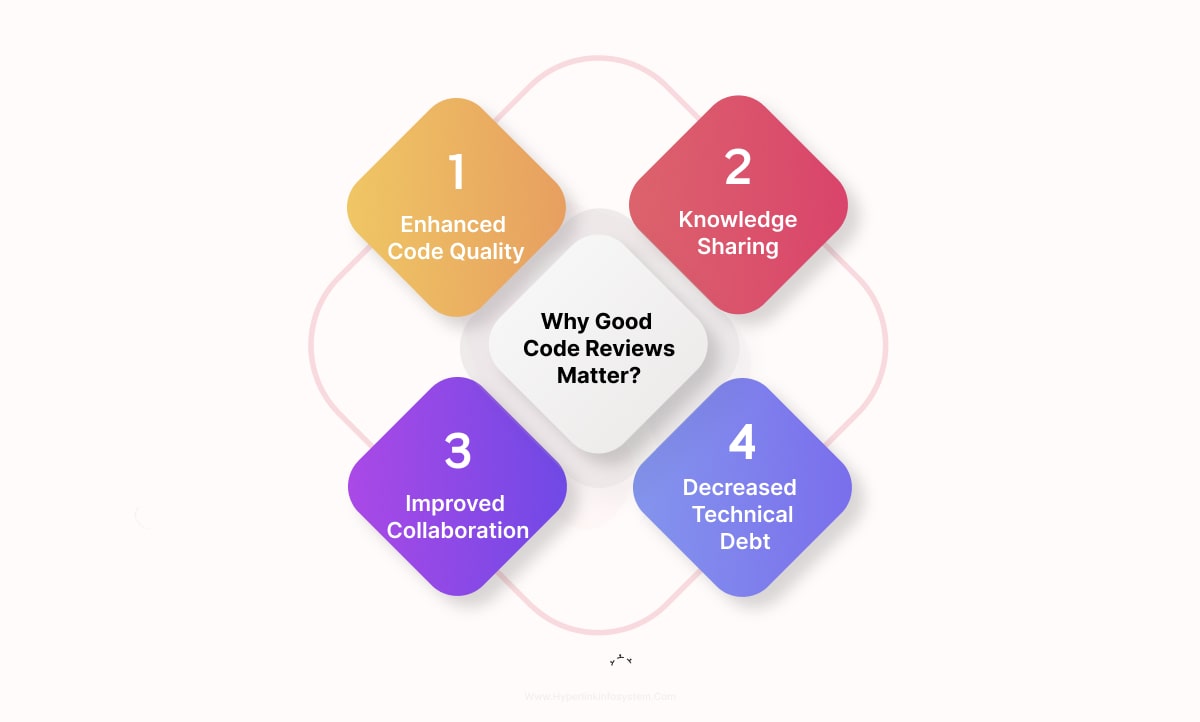
Enhanced Code Quality
Code reviews help detect errors and bugs much earlier in the development cycle, preventing them from reaching production and causing bigger issues. Reviews help improve code maintainability by ensuring clarity, systematization, and effortlessness for future developers' understanding and upgrade. It also assists in comprehending potential security vulnerabilities and confirms that your code is adherent to peer code review best practices.
Knowledge Sharing
Code reviews aren't a part of trending technologies but a protocol that helps the development team share information. This encourages a culture of team learning, and developers receive constructive feedback from their colleagues and reviewers while also learning new coding abilities. It also helps in upskilling junior developers who further hone their coding abilities through code reviews.
Improved Collaboration
Code review facilitates better teamwork as they encourage engineers to collaborate to enrich the overall quality of the codebase. While reviews promote free communication and debate within the development team.
Decreased Technical Debt
Code reviews assist in decreasing the burden of technical debt by discovering and fixing issues before they impact the development process. In simple terms, competent code reviews represent a wager in a software initiative's long-term viability and performance. They help to increase the efficiency of code and collaboration within teams, resulting in superior software output.
Tips to Guide You Toward Effective Code Review
Good code review practices are important to increase the quality of the code, identify errors early on, and facilitate knowledge exchange across development teams. Let's understand some of the basic tips to improve your code review process:
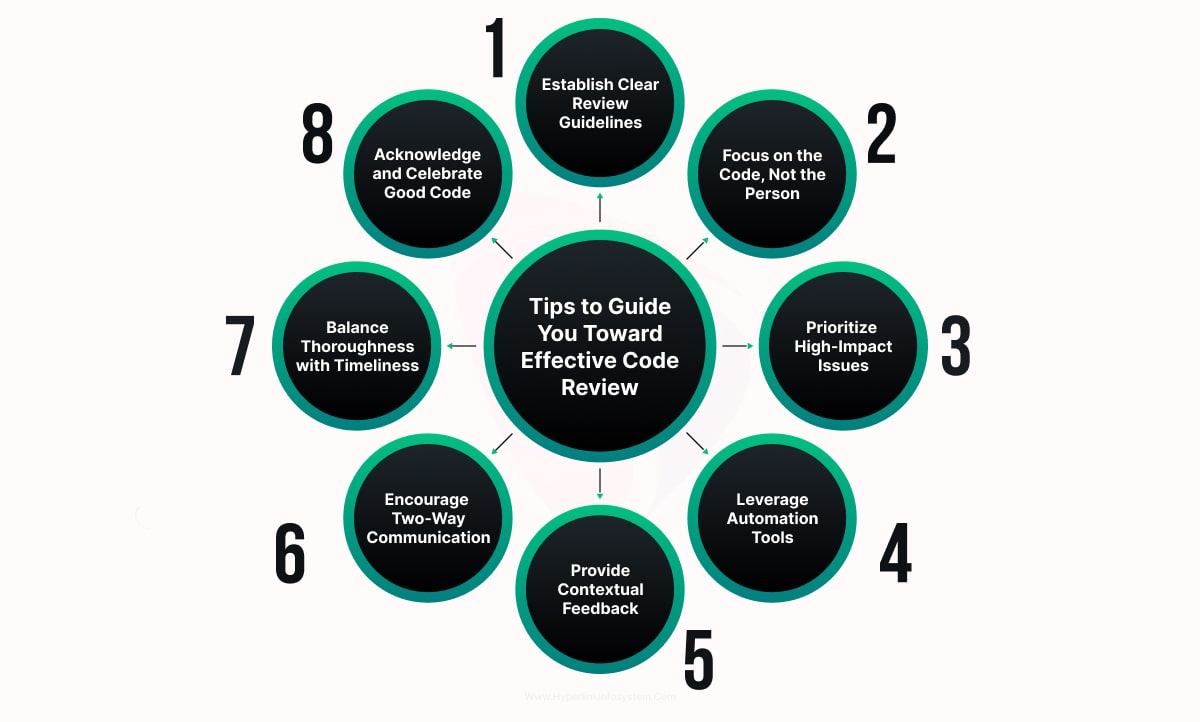
Establish Clear Review Guidelines
Having a systematic code review process facilitates uniformity and efficiency. It's important to define your objectives and specify what reviewers should be on the lookout for, like, for example, readability, security, or performance. Next, you can utilize evaluation criteria checklists like code functionality, style, and test coverage. Keep a set standard for your documentation to preserve a well-documented code-style directory to preclude uncertainty.
Focus on the Code, Not the Person
Better code reviews and good code review practices are performed to improve the code, not demotivate your developer. Hence, it's important to use a constructive tone with phrases like, "You could consider this style, tactic, or approach" instead of saying, "You couldn't be more wrong or you don't understand the basics of coding." Instead of playing the blame game, try to frame your comments as suggestions and try to foster a culture of growth mindset. For the code to be better, it's vital to put importance on learning opportunities over pointing out flaws.
Prioritize High-Impact Issues
Remember that not every feedback will be more or less useful or degrade its value. Classify the areas that impact code quality drastically and then move on to addressing security vulnerabilities and functional errors foremost. Next, determine opportunities for code optimization while ensuring the code is clean and easy to understand for the next time you decide to hire app developers.
Leverage Automation Tools
Among all the latest trends and technologies, automation tools hold the best capability when it comes to handling repetitious checks, permitting code reviewers to concentrate on higher-level tribulations. Linting tools can impose code style requirements automatically, whereas static analysis tools can uncover errors and vulnerabilities. Finally, to ensure that tests pass and code integrates seamlessly before the review begins, establish correct CI/CD pipelines.
Provide Contextual Feedback
Code feedback should be very specific, actionable, and relevant to its actual context. Provide specific suggestions like, "You could add an extra loop to avoid duplication," instead of saying, "You can do better." You should be able to properly explain the reason behind all your proposals and incorporate examples like code snippets to back your ideas.
Encourage Two-Way Communication
Remember that before you Google how to perform a code review, the process is a collaborative effort that works best when open dialogues are encouraged. Engage the developer by asking questions on their approach, and be open to feedback that even an experienced code reviewer could learn from the review process. Utilize these review discussions as an opportunity to brainstorm and share knowledge while fostering a collaborative culture.
Balance Thoroughness with Timeliness
Even though good code review practices along with extensive assessments are important, they don't bog down the development process. It's vital to establish certain time limits for identifying the most acceptable time range for code reviews depending on the level of difficulty. You can also infuse batch reviews, where you get the liberty to minimize fragmentation by combining minor modifications. Finally, instead of aiming for the code to be perfect or faultless, prioritize other parts of the code that will construct your whole project.
Acknowledge and Celebrate Good Code
Acknowledging well-written code motivates developers and supports peer code review best practices. It's also important to highlight unique solutions and clean code while also expressing gratitude by thanking developers for their effort to retain high-quality code. While essentially promoting a positive culture, but maintaining a balance between work and appreciation of contributions.
Benefits of Better Code Reviews
Beginner programmers should grasp that the coding environment or landscape is vast and dynamic, providing a wide range of enterprises, technology, and applications. Hence, following peer code review best practices boasts a plethora of benefits such as:
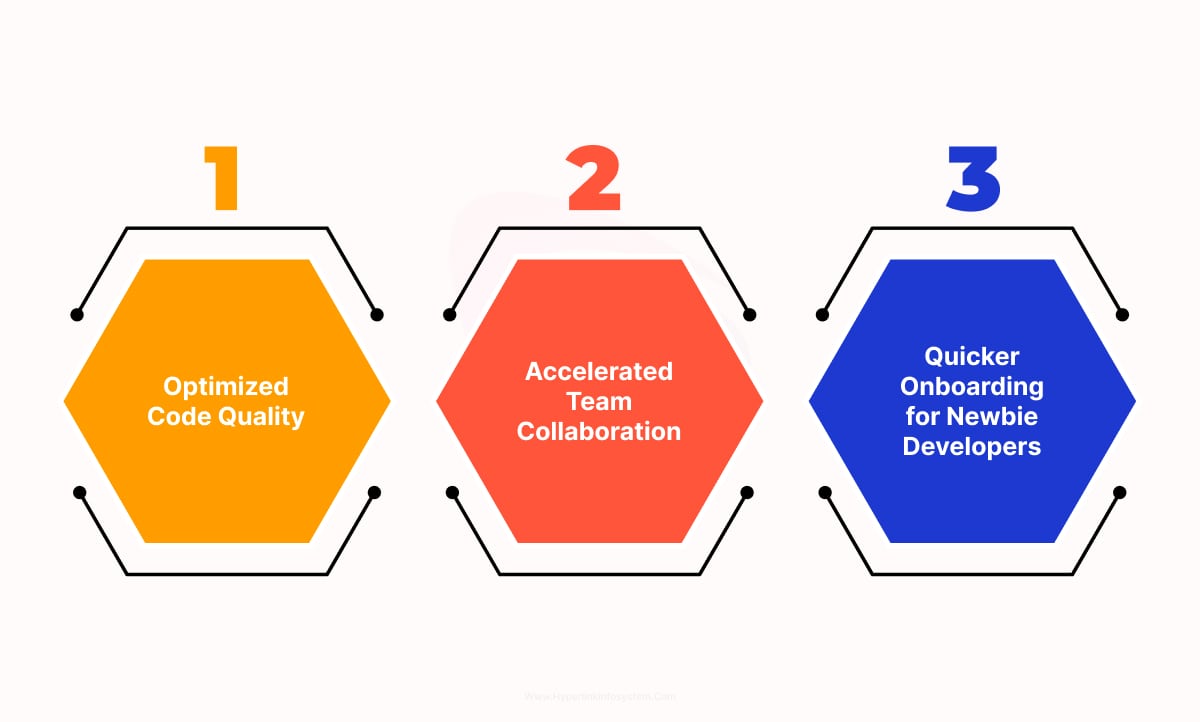
Optimized Code Quality
Having meaningful and valuable code reviews helps in the quick detection of errors before launching. This leads to delivering a code that is resilient and maintainable.
Accelerated Team Collaboration
Code reviews with best practices encourage open communication and information sharing, which further boosts positive dynamics among the developer's team.
Quicker Onboarding for Newbie Developers
Having a stringent and robust review culture stimulates new team members to learn faster. Not only do they quickly grasp best practices and code standards, but they do not undersell their importance in creating solutions. Improved Developer Confidence
Holding accountability for your code is a very important element when you hire app developers. The answer to how to perform high-quality code reviews is constructive and encouraging feedback that drives you toward excellence.
How to Perform High-quality Code Reviews?
To perform a high-quality code review, let's check out these good code review practices:
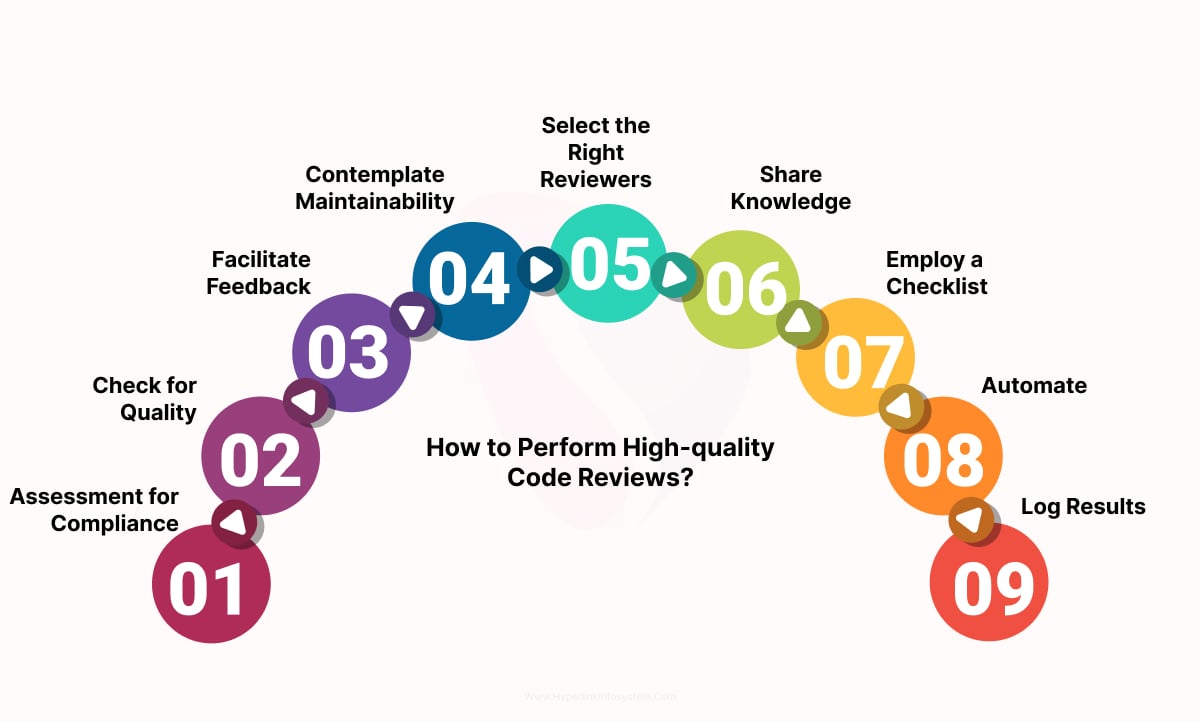
Assessment for Compliance
You have to confirm that the code meets all your primary business requirements and coding standards.
Check for Quality
Be on the lookout for prominent code review issues like reliability, design, complexity, and hidden risks.
Facilitate Feedback
Retain and preserve a culture of constructive feedback; ask your code reviewer to provide you with specific comments and suggestions.
Contemplate Maintainability
Make sure that the code that's being run, tested, or reviewed in the process is easy to maintain and update.
Select the Right Reviewers
Choose a code reviewer who understands how to perform high-quality code reviews. Make sure they've had previous experience with the codebase or topic.
Share Knowledge
It's also important to assist your team members to learn from each other. Upskilling is a vital component of knowledge exchanged for uniform growth.
Employ a Checklist
It's crucial to implement a checklist that'll help you drive your review further.
Automate
Employ code review tools to streamline the procedure for reviewing code.
Log Results
Establish an effective and proper process for documenting the review and how it was resolved.
What to Include in a Code Review Checklist?
Having a checklist ready for good code review practices is the true sign of always being prepared for whatever comes. People might just peck around or pay special attention to a few pet regions while avoiding some crucial ones. Here's a code review checklist to help you get started:
- Documentation
- Security
- Performance
- Observability
- Maintainability
- Readability
- Naming stuff
- Robustness
- Robustness
- Complexity
- Over-engineering (YAGNI)
- Comments
- Tests
- Leveraging existing abstractions properly
How to Make Good Code Reviews Better?
Good code reviews are the ultimate standard for setting benchmarks or milestones. It is inclusive of the basic and simple best practices that teams can start working on promptly while assuring superior and valuable reviews in the long run. Let's crack down the semantics to the question - how to make good code reviews better:
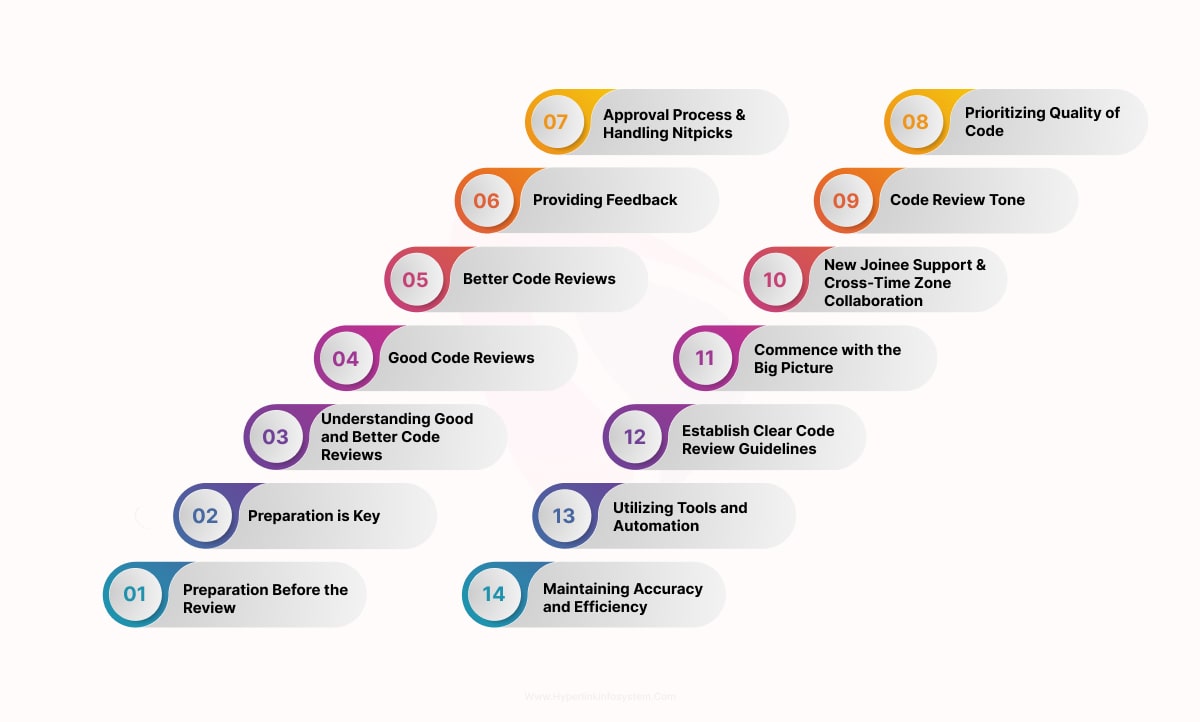
Preparation Before the Review
Before you begin start by understanding the requirements to ensure your familiarity with the feature, problem, or functionality under evaluation. Prioritize the review scope by focusing on the modifications made in the pull request instead of the entire codebase. You can also use the review checklist mentioned above which will include code standards, test coverage, and architectural alignment.
Preparation is Key
Set Context
Before you dive in, ensure you're completely aware of the objective of the code modifications and the project's general goals. This further allows your code reviewer to examine the code's alignment with bigger goals.
Review in Chunks
Break down the bigger code changes into more diminutive, more manageable chunks to simplify review and concentration. This further facilitates more elaborate analysis and tailored feedback.
Utilize Checklists
Create a code review checklist that is precise to your project's conditions. Some common issues that you glimpse include accuracy, readability, maintainability, security, performance, testing, and conformance to style rules. Employ the proposed checklist as a starting point and tailor it to your individual needs.
Understanding Good and Better Code Reviews
Good Code Reviews
Good code reviews focus on peer code review best practices and other fundamental aspects like:
- Transparency and Context: A code reviewer should be in charge of inspecting how the code change settles with the overall codebase, confirming that all the titles and descriptions demonstrate the purpose of the changes.
- Correctness and Scope: Your code reviews should check adequate test coverage, adherence to coding standards, and correctness.
- Constructive Feedback: Pinpoint specific areas for improvement without overwhelming criticism. This is also inclusive of tackling complex logic or untested edge cases.
Better Code Reviews
- Contextual Awareness: Acknowledging the larger ramifications of modifications and taking into account serviceability and system design.
- Empathy in Tone: Speaking in a warm and encouraging tone helps create a collaborative atmosphere in which programmers have no trouble hearing criticism.
- Proactive Communication: When misconceptions happen, having straightforward conversations can conserve time and communicate intent.
Providing Feedback
Making good comments about code reviews will stimulate the author. Highlight the points that need the most attention or even the particular lines or techniques that require attention, and explain why. Establish a unique distinction between critical issues like security flaws and occasional adjustments like stylistic enhancements. Start asking questions and encourage discourse by expressing comments as a question.
Approval Process & Handling Nitpicks
Having a clear communication process for your code reviewer to maintain transparency is crucial. Establishing a portal or channel to discuss whether they approve the changes or if further modifications are needed maintains clarity. This level of clarity helps in attaining misunderstandings and confirms that every comment is addressed before the merger. Nitpick management is critical when it comes to recommendations to help you conduct a successful code review. Distinguish among important feedback and small issues to avoid unneeded input, and use specific prefixes like "nit:" for non-critical observations. This allows you to give attention to more significant matters while simultaneously resolving smaller difficulties.
Prioritizing Quality of Code
You need to retain the code quality before and after review for on-time upgrades and upkeep. Take care of the following things:
- Maintainability: Decide if the code is well-structured and straightforward to understand for new as well as experienced developers.
- Scalability: Determine if the code will function correctly under anticipated future demands.
- Consistency: Assure that the code fulfills the team's set standards and is compatible with the current codebase.
- Documentation: Make sure any new or changed functionality is properly documented.
Code Review Tone
Instead of stating any kind of final claim, try to utilize any type of open-ended questions to foster discussion and commence the examination of concepts. This approach will establish a more supportive and collaborative environment in which contributors feel respected and involved. Ensure you deliver your suggestions in a supportive and positive manner, hence, ensuring a secure environment for feedback, and allowing developers to take ideas without feeling defensive.
New Joinee Support & Cross-Time Zone Collaboration
If you're deciding to involve new team members in your core team to assess better code reviews, provide them extra support and resources. From making them aware of the coding standards and practices to tips to guide you toward effective code review, help them will all the mentorship. This will speed up their learning curve and integration into the team. Now another thing is to facilitate cross-time zone collaboration by being mindful of distributed teams' availability in scheduling reviews. Try to overlap proper hours for discussions or utilize asynchronous communication tools to stimulate proactive complicity across multiple time zones. Encourage open dialogue for authors to explain their decisions, and use them to teach best practices. It's also important to acknowledge and appreciate a well-written code or innovative solutions to boost your team's morale.
Commence with the Big Picture
Instead of becoming completely nitpicky, begin by understanding the overall purpose of the code. Ask questions like: What problem is the code going to solve or will the current solution align with project requirements or how does this change affect the rest of the system? Having a broad perspective will help your code reviewer confirm that the code aligns with the product’s goals and system architecture.
Establish Clear Code Review Guidelines
Having a defined set of rules makes the good code review practices process maneuver more smoothly and consistently. It's vital to ensure team agreement on coding standards, including formatting, naming conventions, and syntax guidelines. Encourage reviewers to provide constructive and actionable criticism that your developers can follow easily.
Utilizing Tools and Automation
Using static code analysis tools like SonarQube or ESLint for automatic detection of common errors. For testing automation, ensure that all unit tests, integration tests, and CI/CD pipelines are conducted before commencing the manual review. Use sites like GitHub, GitLab, or Bitbucket for uncomplicated navigation and annotation.
Maintaining Accuracy and Efficiency
It’s important to focus on key aspects like functionality and performance. Use incremental reviews to encourage regular, smaller evaluations over massive, overpowering ones. Try to aim for decent, functional code that fulfills your requirement standards rather than ideal code, which could then cause unnecessary delivery delays. By stressing these components, your code reviews will not only increase in quality but will also help to create a more productive, engaged, and collaborative development team.
Conclusion
In 2025, coding has evolved from simple scripts to complicated algorithms that drive the intricacies of blockchain technology and artificial intelligence. Hence, associating with organizations with good code reviews is nothing less than a brownie point. Today's programmers have unrestricted access to an abundance of information, tools, and communities for learning, collaboration, and invention. Code reviews are an indispensable component of every successful development team. Not only do they improve code quality while also allowing team members to exchange expertise. We hope that the above-listed tips to guide you toward effective code review will prove lucrative and help you get started on enhancing your code review process.
The above list of information is some broad or maybe generalized suggestions but does not cover all the good code review practices, so you should consult other resources and discuss the needs of your team. Recognizing the advantages of continuous learning with good code reviews is a critical skill for developers to possess since the technology industry is always growing. Both experienced and unskilled programmers should be looking for ways to enhance their abilities. If you want to learn about what's new in mobile app development or what specialized developers can do for you and your company, contact our experts at Hyperlink InfoSystem.
Hyperlink InfoSystem is a leading mobile app development company that specializes in the latest trends and technologies while also allowing the flexibility to hire dedicated developers. At our firm, we believe that code reviews aren't just a quality assurance process, but a futuristic step towards fostering a culture of collaboration, learning, and excellence in software development. By prioritizing good code review practices, using automation, and constructive feedback, you also can accelerate your code review strategy from good to outstanding. Connect with our professionals today to implement good code review practices, and watch your team’s productivity and code quality soar.
FAQs
Q- What are the key components of a code review checklist?
Ans- The key components of a code review checklist are:
- Functionality
- Readability and Maintainability
- Code Structure and Design
- Performance and Efficiency
- Error Handling and Logging
- Security
- Test Coverage
- Compliance with Coding Standards
- Code Reuse and Dependencies
- Documentation
Q- What are the most common issues found during code reviews?
Ans- Some of the most common issues found during code reviews are:
- Vulnerabilities in Security
- Poor Comments and Documentation
- Skipping Tests During Reviews
- Low to No (Lack of Testing)
- Lack of Error Handling
- Incorrect Code Logic
- Inconsistent Code Style
- Unoptimized Code
- Duplicate Code
- Rushed Reviews
Q- How to perform high-quality code reviews?
Ans- To conduct a high-quality code review, prioritize understanding the code's purpose before delving into details, and encourage collaboration and learning among team members.
Q- What are the popular code review tools in 2025?
Ans- The top 10 popular code review tools in 2025 include:
- GitHub
- Gerrit
- Crucible
- Review Board
- RhodeCode
- Bitbucket
- Collaborator
- Codacy
- GitLab
- Azure DevOps Server


















